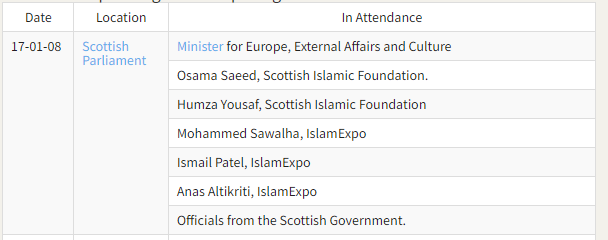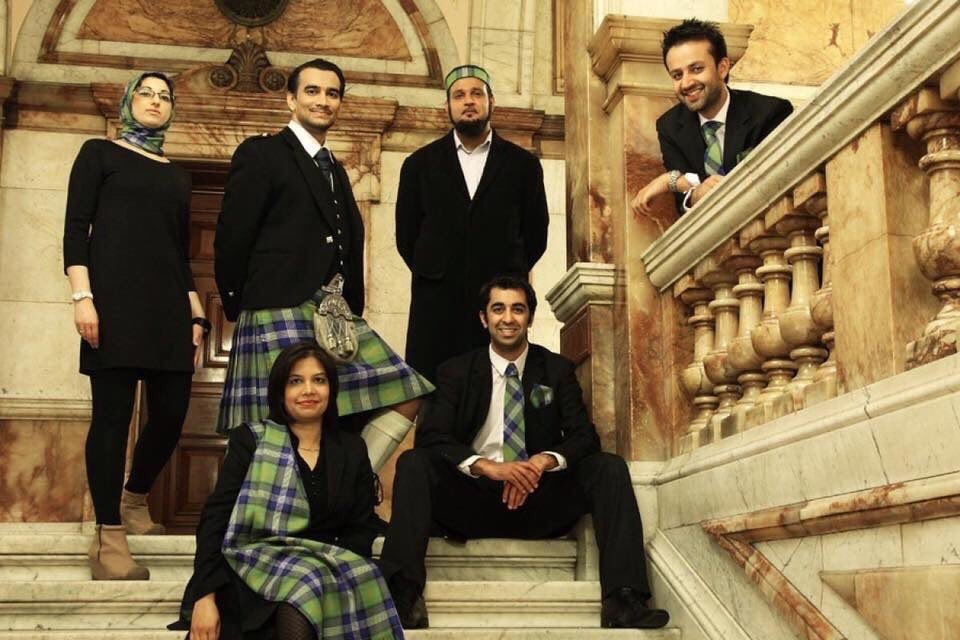Humza Yousaf, a senior Scottish National Party (SNP) politician who brought a fugitive Hamas commander to meet with Scottish ministers, worked for a radical charity condemned by Western governments for its antisemitism and terror ties, and advocated for “progressive political Islam” is the front-runner to succeed Nicola Sturgeon as SNP leader, and become Scotland’s new First Minister.
Yousaf first came to the public’s attention in the late 2000s while serving as an aide to former SNP leader Alex Salmond and other senior party leaders. At this time, Yousaf was also running the Scottish Islamic Foundation (SIF), along with his cousin, Osama Saeed.
In 2010, the Quilliam Foundation, a (now-defunct) Muslim-run counter-extremism organization, prepared a list for the British security officials warning that SIF was an “entry level” Islamist group that contributed to the threat of radicalization and extremism within British Islam.
Parliamentary questions have revealed that Yousaf and Saeed, through SIF, brought extremists to meet with senior Scottish politicians. In 2008, Yousaf organized a meeting with Scotland’s Minister for Europe, External Affairs and Culture, featuring three prominent Islamists: Mohammed Sawalha, Anas Altikriti and Ismail Patel.

Two years earlier, Sawalha had been named by the BBC as a fugitive Hamas commander; and indeed, Sawalha later became a member of the terror group’s political bureau. As for Anas Altikriti, he has long served as a leading member of the Muslim Brotherhood in both the UK and Iraq, and in 2006 he reportedly praised Iraqi “resistance” against British and American troops in Iraq.
Ismail Patel, meanwhile, is another supporter of Hamas, and had already, at the time of the meeting, established a reputation for hardline Islamism, including advocating the killing of adulterers and punishment for “free mixing of men and women.”
Yousaf’s involvement with Scottish nationalism served the interests of SIF. In 2010, opposition parties called for an investigation into the SNP’s decision to give £400,000 of Scottish taxpayers’ money to the Islamist-run group.
Other Islamist groups continued to benefit from Yousaf’s influence over the SNP government. In 2013, Yousaf, now elected and serving as Scotland’s Minister for External Affairs and International Development, announced a £398,000 grant to Islamic Relief, one of the largest Islamist charities in the world, established by figures from the Egyptian Muslim Brotherhood.
Critics claimed more cronyism was likely at work. Before his election to the Scottish parliament, Islamic Relief had appointed Humza Yousaf as its “Media Spokesperson.”
European and Islamic governments have denounced Islamic Relief because of the anti-Semitism of its officials and its long history of close ties to Hamas and other designated terrorist groups. In 2020, the State Department warned about the “blatant and horrifying anti-Semitism and glorification of violence exhibited at the most senior levels of Islamic Relief Worldwide.”
Yousaf’s cousin and SIF colleague, Osama Saeed, is himself a notorious Islamist operative, who also once stood as SNP parliamentary candidate. In 2005, he called for the establishment of an Islamic caliphate. And in 2006, Saeed voiced praise for Al Qaeda operative Anwar Al-Awlaki, writing: “Imam Anwar Al-Awlaki was originally hounded in the US because two of the 9/11 bombers happened to pray at his mosque. … He preached nothing but peace, and I pray he will be able to do so again.” Al-Awlaki later became leader of Al-Qaeda in the Arabian Peninsula, before his death in a 2011 drone strike.
The extent to which Yousaf shares his cousin’s extremism is unclear, although the two remain close.
In 2010, Saeed left Scotland for Qatar, to work for Al Jazeera, the Qatari media channel partly staffed by Muslim Brotherhood operatives. During his time as an elected SNP official, Yousaf has been an enthusiastic supporter of Al Jazeera, and has also boasted of his deals with the Qatari regime.
In 2011, as policy makers, moderate Muslims and counter-extremism analysts expressed fears of an impending Muslim Brotherhood government in Egypt, Yousaf tweeted: “All this talk coming from the US+UK abt an ‘Islamist’ Gov’t taking control is smokescreens and mirrors 2protect their own interests.”
This sort of language from Yousaf, however, has died down in recent years. However, critics have raised alarm at some of the legislation Yousaf has championed. In 2020, for instance, journalists and free expression organizations expressed alarm at the SNP’s Hate Crime Bill, introduced by Yousaf in his role as Justice Secretary. Critics warned the bill, which made it illegal to “stir up religious hatred” regardless of intent, is simply a revived criminalization of blasphemy.
Such legislation may well serve Islamist interests. But while Yousaf continues to advance some other Islamic ideas, particularly around finance, his underlying ideology is not clear-cut.
During the current SNP leadership race, some of the current discussion surrounding Yousaf in British media has revolved around his status as a practicing Muslim and any possible conflicts with the SNP’s more progressivist agendas. Interestingly, Yousaf himself has declared that “mainstream Islam” appears unfriendly to “gay marriage,” but has promised not to use his faith as a “basis” for legislating.
His declared positions have led to some topsy-turvy politics. The race to succeed Sturgeon takes during fractious debates within Scottish politics over the topic of transgender rights. Yousaf now advances a more progressivist approach than rival candidates, claiming he “backed Sturgeon’s positions on same-sex marriage, abortion clinic buffer zones” and various “trans” issues; while rival Kate Forbes, Scotland’s finance minister and a member of the Free Church of Scotland, has, conversely, sought to distance herself from Yousef by reportedly coming out in opposition to the SNP’s gender recognition reform bill, “self-identification for trans people” and same-sex marriage.
On the face of it, these progressivist ideas and Yousaf’s recent statements and behavior do not indicate absolute evidence of continued Islamist leanings. And indeed, Yousaf has expressed some encouraging condemnations of radicalism in recent years, such as his denunciations of Islamist clerics who have praised Pakistani violent extremists. He has further urged mosques not to give platforms to their supporters in the West.
It is possible, however, that Yousaf might be a believer in a genuine confluence of Islamism and progressivism. In 2012, he declared his support for “progressive political Islam.” In the same Twitter thread, he praised the “main Islamic Party” in Tunisia as an example.
Yousaf should clarify his relationship with the hardline Islamists of his and SIF’s past and explain what exactly he means by his support for “progressive political Islam.”
His campaign has not yet returned FWI’s requests for comment.
At the very least, if Yousaf is not an Islamist, he is a fellow traveler of extremists. And indeed – as with many nationalist groups – the SNP has a history of embracing Islamist allies.
In 2005, Azzam Tamimi, the British “special envoy” for the terrorist group Hamas, stated, “We have been impressed by the warm and welcoming attitude of the SNP.”
Meanwhile, Left-leaning media in Britain have critically noted the SNP’s partnership with various British Islamist groups, and the “great lengths” to which SNP leaders such as Nicola Sturgeon have gone “to deny the argument that religious ideology might be motivating Muslims to carry out acts of mass terror.”
This embrace of Islamism does not appear merely to be the product of SNP’s ideas about courting the Muslim vote. Foreign Islamist regimes also attract the SNP’s attention. SNP leaders have visited Iran, diverted public funds into the pockets of Iranian regime proxies, and taken part in events at radical Shia mosques in the UK alongside personal representatives of Iran’s Supreme Leader Ayatollah Khamenei.
Whether or not the SNP benefits from such partnerships is unclear. Although in 2019, Potkin Azamehr noted for the Middle East Forum that Iranian disinformation efforts appeared to be particularly focused on advancing Scottish independence ideas and advancing support for the SNP.
In 2009, the Quilliam Foundation published a warning that, given the news of Yousaf’s cousin, Osama Saeed, standing as an SNP parliamentary candidate, Britain risked electing its first “openly Islamist MP.” Almost fourteen years later, is King Charles about to appoint the United Kingdom’s first Islamist head of government?
Sam Westrop is the director of Islamist Watch, a project of the Middle East Forum.
